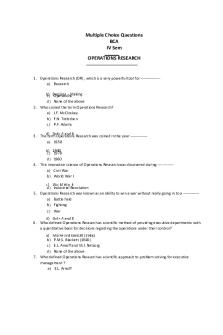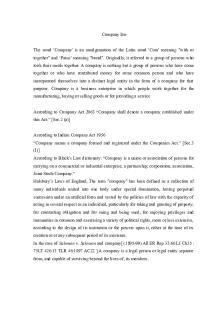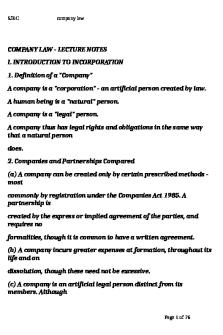Practice MCQ Company LAW PDF

| Title | Practice MCQ Company LAW |
|---|---|
| Author | Vanesa Pulmano |
| Course | Company Law |
| Institution | Royal Melbourne Institute of Technology |
| Pages | 6 |
| File Size | 142.7 KB |
| File Type | |
| Total Downloads | 10 |
| Total Views | 158 |
Summary
This will give you a guide....
Description
PRACTICE MCQ COMPANY LAW Question 1 In the leading case of Salomon v Salomon & Co Ltd [1897] AC 22, the court found that: a. The company should have pay its creditors before it pays Mr Salomon b. The charge given by the company to Mr Salomon was vali c. The company was an agent for Mr Salomon d. The company was a trustee for Mr Salomon
Question 2 What are the consequences of the separate entity doctrine? Correct! a. ALL of the above b. a company has perpetual succession c. a company’s property is not the property of its members d. a company can sue and be sued in its own name
Question 3 A No Liability company can only operate in the: a. Financial Sector b. Mining Sector c. Agricultural Sector d. Public Sector
Question 4 Which of the following can be used by a company incorporated after 1 July 1998 as its internal governance rules? Correct! a. A constitution or the replaceable rules in the Corporations Act 2001 (Cth). b. Memorandum of association. c. The replaceable rules in the Corporations Act 2001 (Cth). d. Articles of association.
Question 5 The statutory indoor management rule allows persons dealing with a company to assume that: a. All of the above b. Directors and officers have the authority to exercise the powers customarily exercised ___by a person occupying that position
c. Directors and officers have been properly appointed. d. The constitution has been complied with.
Question 6 The central distinguishing characteristic of a company is that it is treated as a separate person from its participants. This means that the company can incur and receive obligations and hold property in its own name. For example, a company can: a. Lend or borrow money b. Enter into contracts with its participants and with outsiders such as suppliers and customers c. Be the registered proprietor of land. d. All of the above
Question 7 Which of the following is an advantage of the corporate form? Correct! a. Perpetual succession. b. Establishment costs c. Public law obligations d. Publicity
Question 8 What is the implied authority of an individual director of a company that has more than one director? You Answered a. To do all such things as fall within the usual scope of that office, such as being in charge of the company’s business. b. It depends on the company’s constitution. c. It depends on the terms of the director’s appointment. d. The individual director usually does not have any power to bind the company.
Question 9 Which statement best describes how the principle of limited liability applies to the members of a company? Correct!
a. Members of a company are only liable for any amount outstanding on partly paid shares b. Criminal penalties apply to members if they cannot pay the company’s debts should the company be wound up c. Members of a company are liable for the all of the company's debts should the company be wound up.
d. Members are only liable for the amount they agreed to contribute should the company be wound up.
Question 10 According to the Corporations Act 2001, how does a company amend or modify its constitution? a. Ordinary resolution of the members b. Special resolution of the board of directors c. Ordinary resolution of the board of directors d. Special resolution of the members
Question 11 Which of the following statements about a company making a contract through agents is correct? a. A company is only legally bound by a contract made on its behalf by an agent if the agent is an officer of the company. b. A company is only legally bound by a contract made on its behalf by an agent if its constitution expressly allows the appointment of agents c. A company is legally bound by any contract made on its behalf by an agent with authority. d. A company is only legally bound by a contract made on its behalf by an agent with written authority granted under company seal. Revise Topic 3.
Question 12 Complete this sentence: The Constructive Notice Rule... a. is still relevant to proprietary limited companies. b. is contained within section 130 of the Corporations Act. c. provides notice to businesses under construction. d. has been abolished by section 130 of the Corporations Act.
Question 13 Which of the following is not a major source of funds for a company? a. Profits (if any) not distributed to members b. Debt capital c. The personal wealth of members d. Equity capital
Question 14 Which of the following statements about the directors of a company is true? a. The officers of a company are answerable to the directors b. Every decision by a company board is subject to the approval of the members. c. Directors may delegate their management functions to the company's executives. d. All directors are full-time employees of the company
Question 15 Which of the following is the best description of the significance of the decisions in Salomon v Salomon & Co Ltd (1897)? a. The notion of limited liability should not apply to corporations owned and operated by a single person. b. The concept of separate legal personality cannot be used by a sole trader to avoid liabilities to creditors. c. A shareholder who is also involved in the management of the company is not entitled to the benefit of limited liability. d. The benefits of incorporation were capable of extending to small, private companies.
Question 16 Which of the following is something a company has the power to do which an individual does not? a. Enter into contracts b. Own property c. Appear before a court without legal representation d. Issue shares
Question 17 Participants in a company may agree between themselves that the company will limit its activities in certain ways. What is the effect of an act by a company that is outside the scope of these restriction in its constitution? c. An act of the company contrary to the restrictions in the company's constitution may be breach of the statutory contract represented by the company's constitution d. Any act of the company contrary to the restrictions in the company's constitution is not a breach of duty by any participant involved.
Question 18 Which of the following cases supports the proposition that the courts will pierce the corporate veil to treat obligations imposed on participants in a company as binding on the company in circumstances where the company has been used to avoid that duty? a. Littlewoods Mail Order Stores Ltd v McGregor (1963) 3 All ER 855 b. Salomon v Salomon & Co Ltd (1897) AC 22 c. Smith, Stone & Knight Ltd v Birmingham Corporation (1939) 4 All ER 116 d. Gilford Motor Co Ltd v Horne (1933) Ch 935
Question 19 Which of the following is not a matter typically dealt with by the company's internal governance rules? a. Rules relating to dividends b. Penalties for breach of the duties owed by directors c. Rules relating to the transfer and transmission of shares d. The appointment and removal of the company's officers e. The procedure for convening and conducting directors and members meeting.
Question 20 How does a company amend its constitution? a. By an ordinary resolution of the board of directors b. By a special resolution of the board of directors c. By a resolution passed by at least 75% of the members d. By an ordinary resolution of the members.
Question 21 Under Corporate Act 2001 (Cth) s 140 the internal governance rules have effect as a contract. a. Between a member and each other member b. Between a member and each director c. Between a director and each other director d. Between each director and the company e. Between the company and each member
Question 22 In what circumstance can a member enforce compliance by the company with the internal governance rules?
d. Where the internal governance rule confers a right that its personal to the member in their capacity as a member (eg the right to vote at general meetings).
Question 23 A company can direct execute a document a. By affixing its common seal together with the signatures of two officers b. By having the document signed by two company officers c. By using any particular procedure set out in the company's constitution
Question 24 Which of the following is the best description of apparent authority? c. The company has not actually agreed that the agent can act on its behalf, but the company has "held out" that they can, and a person dealing with the company has relied on this holding....
Similar Free PDFs

Practice MCQ Company LAW
- 6 Pages

MCQ Company Law
- 25 Pages

Law test - MCQ Practice test
- 7 Pages

Company law
- 55 Pages

Business Law and Practice MCQ final
- 24 Pages

MCQ Family LAW 1 FOR Practice
- 27 Pages

DS 2016 MCQ - Practice MCQ
- 19 Pages

Chapter 1 MCQ - Practice MCQ
- 22 Pages

Chapter 5 MCQ - Practice MCQ
- 15 Pages

Chapter 4 MCQ - Practice MCQ
- 13 Pages

Chapter 3 MCQ - Practice MCQ
- 12 Pages

Company Law - kkkkkkkkkkkkk
- 206 Pages

Company Law 2018
- 89 Pages

Company law lecture notes
- 9 Pages

COMPANY LAW -LECTURE NOTES
- 48 Pages
Popular Institutions
- Tinajero National High School - Annex
- Politeknik Caltex Riau
- Yokohama City University
- SGT University
- University of Al-Qadisiyah
- Divine Word College of Vigan
- Techniek College Rotterdam
- Universidade de Santiago
- Universiti Teknologi MARA Cawangan Johor Kampus Pasir Gudang
- Poltekkes Kemenkes Yogyakarta
- Baguio City National High School
- Colegio san marcos
- preparatoria uno
- Centro de Bachillerato Tecnológico Industrial y de Servicios No. 107
- Dalian Maritime University
- Quang Trung Secondary School
- Colegio Tecnológico en Informática
- Corporación Regional de Educación Superior
- Grupo CEDVA
- Dar Al Uloom University
- Centro de Estudios Preuniversitarios de la Universidad Nacional de Ingeniería
- 上智大学
- Aakash International School, Nuna Majara
- San Felipe Neri Catholic School
- Kang Chiao International School - New Taipei City
- Misamis Occidental National High School
- Institución Educativa Escuela Normal Juan Ladrilleros
- Kolehiyo ng Pantukan
- Batanes State College
- Instituto Continental
- Sekolah Menengah Kejuruan Kesehatan Kaltara (Tarakan)
- Colegio de La Inmaculada Concepcion - Cebu
